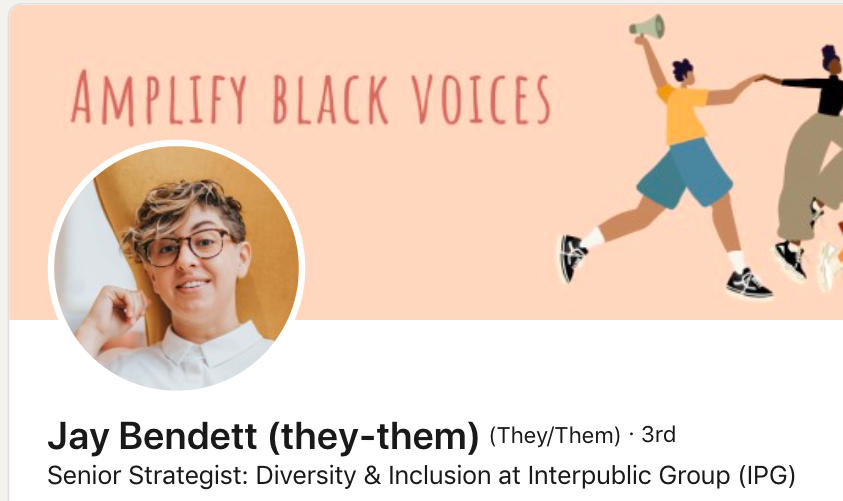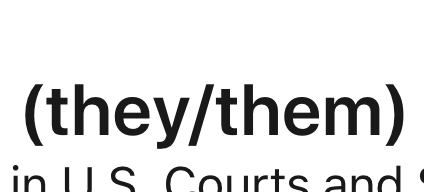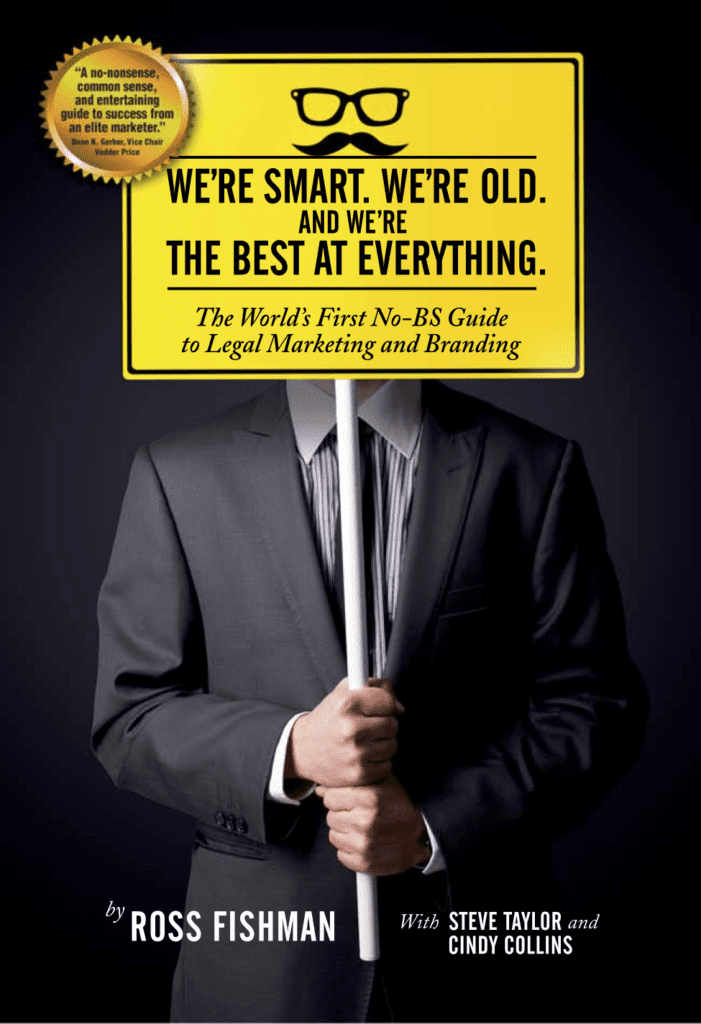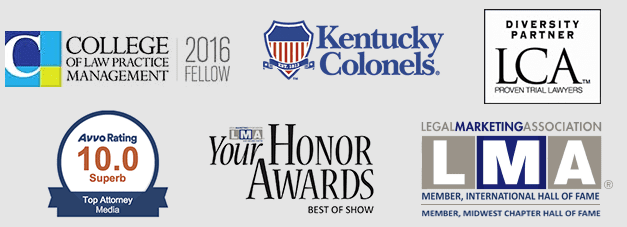Bios for nonbinary professionals might seem tricky. Some simple considerations.
I was interested to read that a partner at a prominent AmLaw 100 law firm recently came out as “non-binary.” That is, this individual identifies neither as male nor female and uses they/them pronouns, rather than he/him or she/her.
This decision generated many articles across the legal media, suggesting to me that the firm issued a press release or otherwise directed its public relations professionals to spread the word.
That felt like a positive development.
A large and prestigious firm was (1) advancing an important issue of inclusivity, and also (2) recognizing the benefit to marketing and recruiting in supporting LGBTQIA professionals.
As both a legal marketer who’s edited literally thousands of website biographies and a father who’s been repeatedly educated on LGBTQIA-related issues by his enlightened 20-something children, I immediately wondered how the firm addressed this individual’s (“Milla”) pronouns in their firm bio. I was mildly disappointed to see that the bio simply avoided using any pronouns. Instead, it simply repeats Milla’s first name each time a sentence referred to them―seven consecutive “Millas” in seven sentences without a single “they” “them” or “their.”
I get it. I have many liberal, over-50 friends―executive committee members at prominent firms―who aren’t yet quite comfortable or up to speed on the issue of gender fluidity. Others are concerned about the reaction of clients and prospects.
Getting up to speed
According to a new study by the The Williams Institute on Sexual Orientation and Gender Identity Law and Public Policy at the UCLA Law School, there are 1.2 million nonbinary people living in the US. As society gradually learns more about the spectrum of human gender and sexuality, professional firms are working, perhaps struggling, to adapt to the new reality. Still largely controlled by folks who grew up before gay people really “existed,” this is a lot of change in a short amount of time. I see it as an issue of culture and education, i.e. (1) are you the type of person who is willing to be open-minded on this issue and, if you are, (2) has someone taught you about it?
Obviously, you can educate yourself if you’re so inclined; there’s a lot of good material online regarding gender and sexuality. One excellent article I regularly circulate to my friends is the simple and clear (but appallingly named) “CISGENDER?! Is that a disease?” on Medium.
The non-binary professionals’ “pronoun issue.”
In professional profiles (e.g. website bios or LinkedIn), the unstated rule is a 3:1 ratio between the person’s name and pronouns. That is, the text seems to flow most comfortably if you open with the person’s first name, then use pronouns the next two times, then repeat the person’s name, followed by two more pronouns. That is, “Ross … He… He… Ross… [etc.]” (“He” or “His” would be interchangeable in this context.)
As a workaround, the biography’s author opted to avoid pronouns entirely and simply repeated the lawyer’s first name at every personal reference―seven consecutive times. To the average reader, failing to include personal pronouns feels suspicious, like someone’s hiding something. Further, it’s a missed opportunity to casually normalize the use of “they” pronouns and educate more members of the legal, business, and marketing community.
Most marketers haven’t yet had the occasion to address these issues. So, I’m going to try to lay out some basic principles as I understand them.
Drafting a non-binary professional’s bio can seem tricky.
It means that you must be careful not to inadvertently create any confusion for the reader regarding who or what the plural pronouns refer to. Consider this blurb: “Brittany is a lawyer who represents companies. They…” At that point, it can briefly be unclear to the reader whether “they” is referring to non-binary Brittany or the “companies.” This means that the bio must be structured to avoid any accidental confusion. That’s just the careful editing that every professional’s profile deserves.
There’s a simple editing work-around.
First, set the stage at the very beginning by including “(They/them)” at the top, alongside the person’s photo, name, and contact info, that is, “John Smith (they/them).” Here’s an example from LinkedIn:

But that’s just the start; less-educated readers may still not understand what that means. It can feel awkward or intimidating for people as they begin to get comfortable with plural pronouns, so consider it an opportunity to positively influence your audience.
Add some education in nonbinary bios.
Open by using the pronoun in a context where there is no chance of confusion over singular versus plural, e.g. “Milla is a trial lawyer specializing in international arbitration; they have particular expertise in banking cases. (Note that I intentionally avoided using the plural “arbitration cases” here, which could have led to a momentary misunderstanding.)
This addresses the issue at the very top and informs the reader to be aware that any upcoming “they,” “them” or “their” might relate specifically to Milla, not exclusively to groups or plural nouns.
Further, it could have been helpful to provide some additional context. For example, Milla’s biography ends, “Milla maintains an active appellate and pro bono practice.” A quick look at their LinkedIn profile shows that most of these pro bono efforts are in support of LGBTQ groups and organizations. Specifically naming these groups would provide additional relevant information. (See my sample edit at the end.)
Always be proud of who you are.
There’s not much downside to describing an individual thoroughly in his/her/their biography. Fishman Marketing has been branding individuals and law firms for 25 years. My strict rule is that both firms and individuals should clearly decide who they are and what they offer, and proclaim that attribute loudly and proudly. If you do, those who are seeking that trait will be drawn to you, as a client or employee. Similarly, those who eschew it will avoid you. Frankly, you want them to―you won’t have a good long-term relationship with those who don’t respect your most fundamental values.
Be clear about who you are and the benefits of what you offer, and like-minded people will be drawn to you. If you’re tough or creative or friendly; or a particular nationality, race, or gender; or a large or small firm, let everyone know. Those who do not want that aren’t likely to be a successful relationship anyway. There’s plenty of work to go around; don’t try to be something you’re not. Just seek to attract those who value you.
Here’s a light edit to Milla’s biography:
Milla is a commercial litigator who tries cases; they have significant experience litigating matters that involve international relations and the foreign relations law of the US. They are fascinated by the intersection of law and information, e.g. data privacy, the attorney-client privilege, online defamation, and intellectual property.
Milla often leverages their Spanish-language skills and deep understanding of different cultures in representing foreign governments and multinational corporations in international disputes in US courts. They often help coordinate global legal strategy in cases that span jurisdictions, and handle state and federal appeals at all levels. Lawyers across the profession seek Milla’s advice regarding complex issues of attorney-client privilege.
In addition, Milla maintains an active pro bono practice, supporting lesbian, gay, bisexual, and transgender (LGBTQIA) causes, including both as a member of NALP’s “Non-Binary Task Force,” and as a board member of the Bay Area Lawyers for Individual Freedom (BALIF), the legal profession’s oldest and largest association of LGBTQIA persons.
I sincerely applaud Milla and the firm for taking this positive step and helping create a more diverse and inclusive profession.
—————————————————-
Need a new brand or website?
Contact Ross Fishman directly to discuss your firm’s branding needs at +1.847.921.7677 or ross@fishmanmarketing.com. We also recommend Ross’s definitive book on the subject, “We’re Smart. We’re Old. And We’re the Best at Everything. The World’s First No-BS Guide to Legal Marketing and Branding” available at Amazon here. A free .pdf download is available here.



